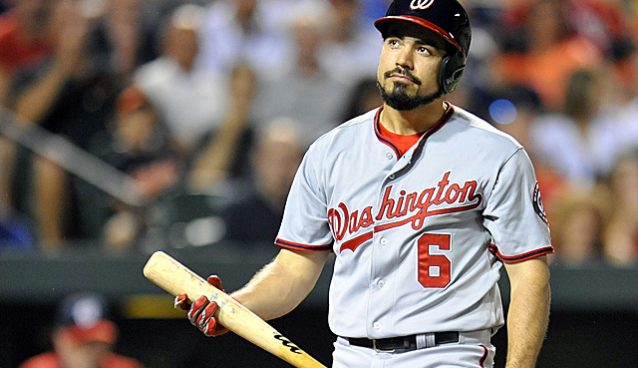
Stardust in the Pine Tar
By: Holly M. Wendt
“He’s an alien,” Williams said. “He’s not human. That’s not real. That’s crazy. And I’m hitting behind him, too, and I’m just constantly watching him and I’m like, ‘Oh, my God.’ What he’s doing is amazing. He plays hard. He’s a smart player. And what he’s doing, I just love watching and being a part of it.”
Hiding in plain sight, under plain language—it was the strategy they’d depended on, and Hoskins, finally, had learned enough to keep the joke going: “That guy is pretty good himself, too. So I guess we can be alien friends.”
The nature of human levity was one of the early challenges, and Nick’s pretty certain his alien friend started hitting dingers simply so people had some kind of distraction. But, with time, Hoskins has gotten better at emulating what gets a good laugh, as long as he can keep Rhys from hanging around Rupp or watching old video, from the Papelbon era.
When Hoskins hit the first one out for Philadelphia and the team gave him the freeze-out, Nick thinks Hoskins honestly didn’t notice. They’d gone over how humans give high fives to celebrate before, and so Hoskins just kept on with the gesture. After the game, Rhys confessed that slapping the air alone did feel different—not as pleasing, somehow, to pass through instead of connect, the way he’d felt against the rings of Saturn, which was one of the reasons he’d kept traveling, part of why he’d come all the way to Earth, water and soil Earth, full of good, dense matter. But Rhys remembered where most people sat and imagined them there, and that was all right.
Everyone talks about the hitting, but it’s the imagining that is Rhys’ real alien advantage. Of course, the two go together: Hoskins imagines the place he wants the bat to meet the ball, and when the ball’s path and the bat’s will chart the same point, he swings.
After Nick found out—you know, about the alien thing, having caught Rhys tucking antennae beneath his fluffy hair, way back in Lehigh Valley—he’d asked how Rhys had done it. Did he have a grav-beam to pull the ball into the perfect spot? Mind controlling the pitchers?
“No,” Hoskins said, “never. That’s cheating. But this does seem easy, compared to hitting Earth from 5.7 light years away. The pitcher’s only 18.44 meters—”
“Sixty feet, 6 inches, man, or they’ll know you’re an alien for sure.”
It’s hard being the only one who knows the truth, but so far, they’ve done all right. On the best days, Nick Williams can imagine this going on—not just Rhys’ home runs, not just two young corner outfielders hitting well—but something bigger, more cosmic: a future in which this team collects more than stardust.
Baseball Players as IKEA Products
By: Meg Rowley
Building IKEA furniture is similar to constructing a winning baseball team in that front offices attempt to follow a carefully prepared plan only to have to take the whole thing apart and start over because they skipped a critical step 15 moves ago after refusing to ask for help or admit they don’t know Swedish. A few pieces from the fall catalogue might look familiar.
The Mätz
The Hëllikson
The Gållårdo
The Statön
The Seageer
Farewell Tigers Field Mics
By: James Fegan
For most, Matt Boyd inexplicably dragging a no-hitter into the ninth inning Sunday was the first time the final Tigers-White Sox series of 2017 drew attention all weekend. For this Chicago-based reporter, however, it was a sad farewell to the only prism of truth still left in this media-saturated yet hopelessly manicured sports world.
What did @JustinVerlander say? Turn down those field mics #tigers #redsox pic.twitter.com/48Jjf9np8B
— Evan Jankens (@KINGoftheKC) April 10, 2017
Starting pitchers speak after every game; managers take questions before and after until there is nothing left to say. There are several options to get real-time strike-zone plotting on the wondrous internet, yet there is still no technology that offers better clarity of commentary on the day’s umpiring than the field mics at Comerica Park.
FIELD MIC pic.twitter.com/RXmn80u9ag
— Trubinsky (@TimBaffoe) June 4, 2017
As a journalist who seeks to capture the emotion, intensity, and focus on elite execution present in every moment of a major-league game, it pains me that it could be seven months before I again hear the pain and frustration of a single instant of failure on the ballfield, boiled down to a burst of gorgeous lyricism.
— Trubinsky (@TimBaffoe) June 4, 2017
Privacy must be respected, but there’s a feeling of isolation knowing that players only share what they want us to hear. There is a wall between their feelings and us, and peeling it aside for a moment, even if just to find out which former All-Star is a strict utilitarian, feels like a blessing from the baseball gods.
ian kinsler with the best f-bomb in detroit sports since SVG https://t.co/YSWOBKU9TU
— Chris Gibbons (@ChrisDGibbons) August 16, 2015
Farewell Comerica Park. We will miss you terribly, and our winter will be colder knowing not only that we will miss you in our lives, but that we do not deserve you, at least not as much as Detroit deserves to host a World Series.
The mics caught some naughty language during the @Royals -Tigers tonight @awfulannouncing pic.twitter.com/lGWxFQlvh2
— Séan Thompson (@SeanMThompson) August 16, 2016
Or even an All-Star Game. Or a BP event. Anything, really.
Thank you for reading
This is a free article. If you enjoyed it, consider subscribing to Baseball Prospectus. Subscriptions support ongoing public baseball research and analysis in an increasingly proprietary environment.
Subscribe now
Tusen tack.